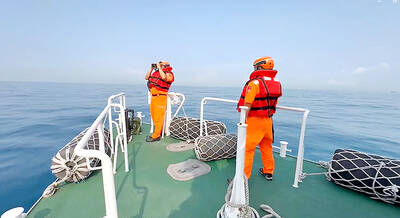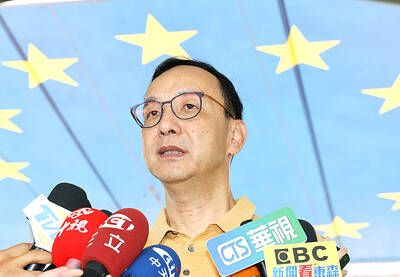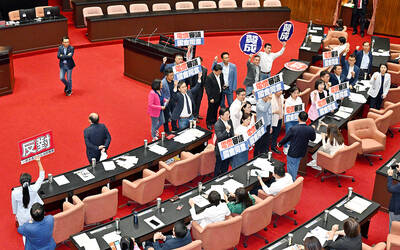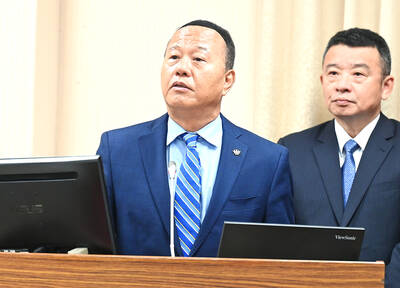The heads of cross-strait affairs in Taiwan and China had a conversation yesterday via a newly installed telephone hotline connecting the two sides of the Strait, during which they discussed recent developments in cross-strait relations, following rumors that the Chinese side has refused to answer calls since the Jan. 16 presidential and legislative elections.
During the conversation, Mainland Affairs Council Minister Andrew Hsia (夏立言) and China’s Taiwan Affairs Office Minister Zhang Zhijun (張志軍) exchanged Lunar New Year greetings.
It was the first time Hsia and Zhang used the hotline since the Jan. 16 elections, in which president-elect Tsai Ing-wen (蔡英文) of the Democratic Progressive Party (DPP) won the presidency and the party gained a legislative majority.
Hsia told Zhang that peaceful and stable development of cross-strait ties is the hope of people across party lines in Taiwan, and that both sides of the Strait should maintain and cherish the achievements made so far, a statement issued by the council said.
Expanding and deepening cross-strait engagement would help improve mutual trust and understanding, Hsia said, adding that both sides should avoid actions that could escalate tensions, but instead promote a healthy relationship.
The conversation came one day after Zhang issued a Lunar New Year message in which he lauded the achievements in the development of cross-strait ties and expressed hope that the two sides would continue to work together to maintain peace across the strait in the coming year, basing their efforts on the so-called “1992 consensus,” a tacit understanding between the Chinese Nationalist Party (KMT) and the Chinese government that both sides of the Strait acknowledge there is “one China,” with each side having its own interpretation of what “China” means. Former Mainland Affairs Council chairman Su Chi (蘇起) admitted making up the term in 2000.
The DPP has refused to recognize the existence of any such consensus.
There have been concerns that relations across the Taiwan Strait would deteriorate under Tsai’s administration, since the DPP is known for its pro-Taiwan independence stance.
Tsai, without using the term “1992 consensus,” has said that she “understands and respects” the “historic fact” that Taiwan and China “reached some common acknowledgments and understanding in 1992.”
In an interview with the Liberty Times (sister newspaper of the Taipei Times) late last month, Tsai said the two sides of the Taiwan Strait would need to work hard to build a “consistent, predictable and sustainable” relationship.

An increase in Taiwanese boats using China-made automatic identification systems (AIS) could confuse coast guards patrolling waters off Taiwan’s southwest coast and become a loophole in the national security system, sources familiar with the matter said yesterday. Taiwan ADIZ, a Facebook page created by enthusiasts who monitor Chinese military activities in airspace and waters off Taiwan’s southwest coast, on Saturday identified what seemed to be a Chinese cargo container ship near Penghu County. The Coast Guard Administration went to the location after receiving the tip and found that it was a Taiwanese yacht, which had a Chinese AIS installed. Similar instances had also

GOOD DIPLOMACY: The KMT has maintained close contact with representative offices in Taiwan and had extended an invitation to Russia as well, the KMT said The Chinese Nationalist Party (KMT) would “appropriately handle” the fallout from an invitation it had extended to Russia’s representative to Taipei to attend its international banquet last month, KMT Chairman Eric Chu (朱立倫) said yesterday. US and EU representatives in Taiwan boycotted the event, and only later agreed to attend after the KMT rescinded its invitation to the Russian representative. The KMT has maintained long-term close contact with all representative offices and embassies in Taiwan, and had extended the invitation as a practice of good diplomacy, Chu said. “Some EU countries have expressed their opinions of Russia, and the KMT respects that,” he

AMENDMENT: Contact with certain individuals in China, Hong Kong and Macau must be reported, and failure to comply could result in a prison sentence, the proposal stated The Chinese Nationalist Party (KMT) and the Taiwan People’s Party (TPP) yesterday voted against a proposed bill by Democratic Progressive Party (DPP) lawmakers that would require elected officials to seek approval before visiting China. DPP Legislator Puma Shen’s (沈伯洋) proposed amendments to the Act Governing Relations Between the People of the Taiwan Area and the Mainland Area (臺灣地區與大陸地區人民關係條例), stipulate that contact with certain individuals in China, Hong Kong and Macau should be reported, while failure to comply would be punishable by prison sentences of up to three years, alongside a fine of NT$10 million (US$309,041). Fifty-six voted with the TPP in opposition

VIGILANCE: The military is paying close attention to actions that might damage peace and stability in the region, the deputy minister of national defense said The People’s Republic of China (PRC) might consider initiating a hack on Taiwanese networks on May 20, the day of the inauguration ceremony of president-elect William Lai (賴清德), sources familiar with cross-strait issues said. While US Secretary of State Anthony Blinken’s statement of the US expectation “that all sides will conduct themselves with restraint and prudence in the period ahead” would prevent military actions by China, Beijing could still try to sabotage Taiwan’s inauguration ceremony, the source said. China might gain access to the video screens outside of the Presidential Office Building and display embarrassing messages from Beijing, such as congratulating Lai